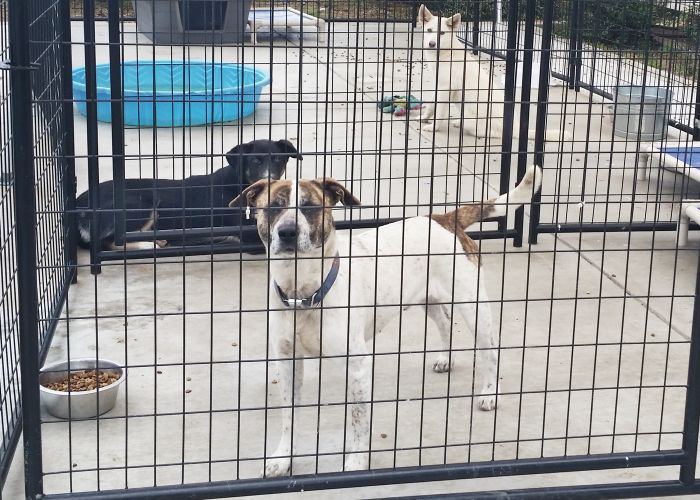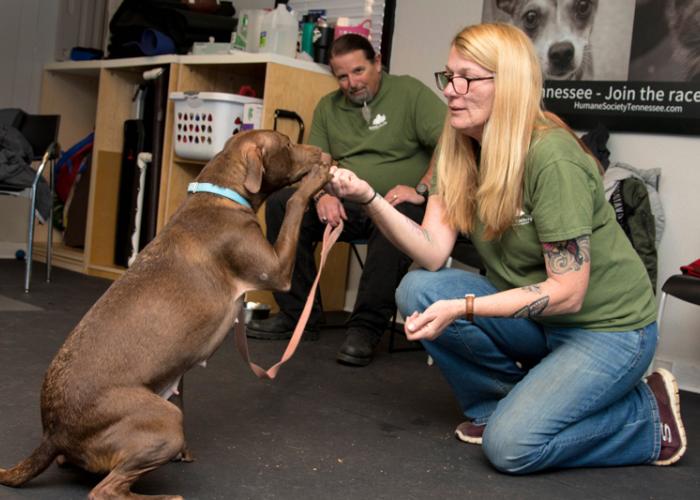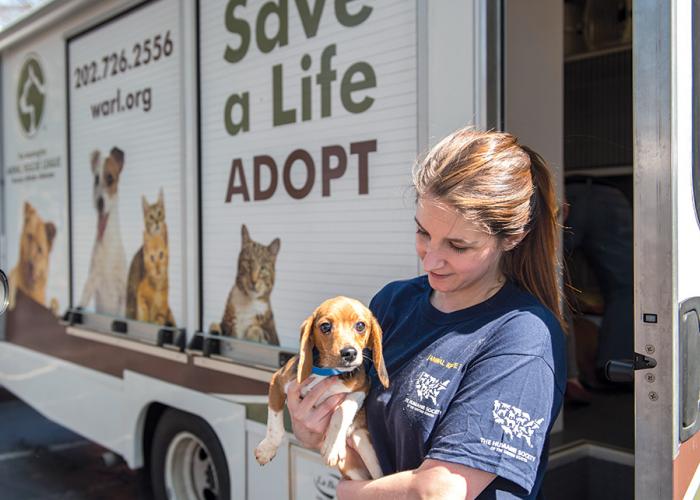Hope in the valley
Fresno group works to improve animal outcomes amid difficult circumstances
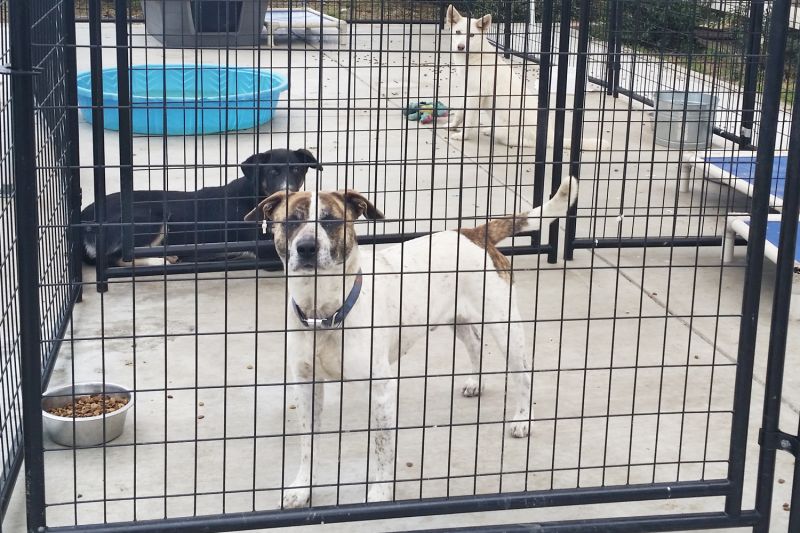
Fresno Humane Animal Services (FHAS) is breathing new life into animal welfare efforts in California’s San Joaquin Valley … from the parking lot of an abandoned morgue.
FHAS’s unusual locale is one of a number of challenges the group inherited when it took over last year as Fresno County’s animal control provider. The agency serves a sprawling service area with 6,000 square miles and a population of 800,000 people. Largely rural, the region has been plagued by high shelter euthanasia rates and a lack of lifesaving programs, notes FHAS board president Brenda Mitchell.
When asked about their current facilities, FHAS leaders respond with dry chuckles. The setup includes two kennels under carports, an old garage with some kennels and a trailer that serves as an office, Mitchell says. The morgue was condemned because of the presence of asbestos and other dangerous materials, she adds.
“We’re making the most out of what we’ve got here,” Mitchell says, cheerfully pointing out that a local Boy Scout troop recently converted a weedy patch of the agency’s lot into a little play area for the dogs.
And that can-do attitude is paying off: Since FHAS took over last October, animal control’s monthly euthanasia rate has plummeted—thanks largely to its partnerships with rescue groups. In April, FHAS took in 524 animals, and its euthanasia rate dipped below 9 percent, with 33 animals reclaimed, 19 adopted and 382 transferred to rescues. Mitchell calls FHAS’s success a testament to what an organization can accomplish with the right people and a mentality geared to saving lives—despite obstacles like less-than-stellar facilities.
FHAS partners with more than 50 rescue groups, some the result of relationships Mitchell has nurtured in her 10-plus years in the rescue world. The organization also invited outreach veterinarian Cindy Karsten of UC Davis’ shelter medicine team to speak to the Fresno County Board of Supervisors, and she took a personal interest in helping FHAS succeed. Karsten helped FHAS develop relationships with large humane societies outside the area, which generally have a lower population of homeless animals because of solid education and low-cost spay/neuter programs. FHAS sends a variety of dogs to rescues, and runs adoption specials and off-site adoption events for those it’s unable to place with other groups.
“On the one hand, it’s overwhelming if you look at the whole picture,” notes FHAS executive director Teri Rockhold. “But if you look at individual situations, we’re doing well.” FHAS officials have easily formed relationships with rescue groups because they’ve all worked in that field, she explains. And the group is spreading the spay/neuter gospel by partnering with the HOPE (Halt Overpopulation with Prevention and Education) Animal Foundation, a nearby low-cost spay/neuter clinic that runs a variety of promotions to make surgeries more accessible.
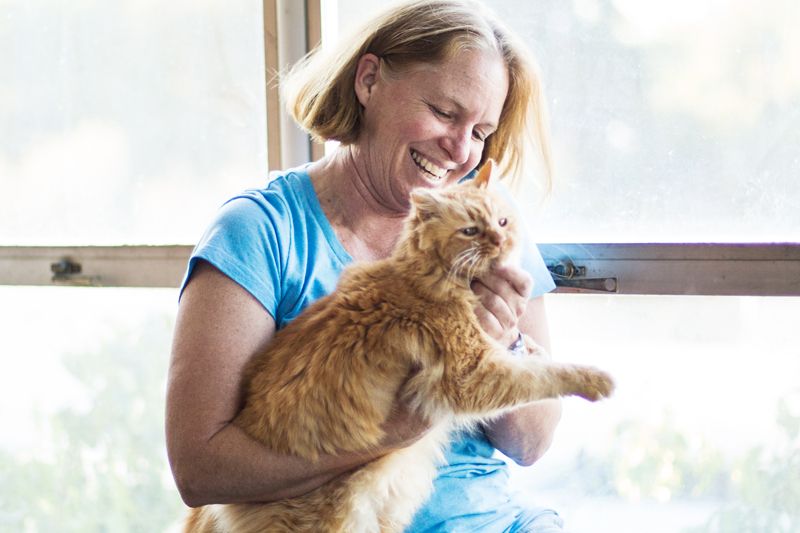
The road to the morgue
Mitchell describes herself as one of “the noisy ones.” FHAS came to be after she and other like-minded animal advocates decided to do more than talk the talk.
She volunteered for four years with the Central California SPCA (CCSPCA), worked full-time for another three in its education department and in 2009 helped found the Animal Compassion Team (ACT), an all-volunteer nonprofit rescue where she serves as president. ACT, she says, has been “one of the loud groups in the background, screaming for change.”
When the county’s animal control contractor filed for bankruptcy last year, ACT saw an opportunity and seized it, bidding on the contract for the unincorporated portions of Fresno County. ACT got the contract and created a new nonprofit—FHAS—to handle animal control for the county. The new group has about 15 employees. Its volunteer program started with just a handful of trusted longtime ACT volunteers while the organization established medical protocols to protect both the incoming animals and existing residents. The staff had to figure out procedures before incorporating too many volunteers, Mitchell says, but now believes the agency has a good system in place and hopes to grow its volunteer corps.
And how exactly did they wind up on the grounds of a morgue? CCSPCA had provided animal control services for both the county and the city of Fresno for decades, but the county government’s relationship with the local SPCA ended in 2012, leaving officials scrambling to quickly set up a shelter. The county’s setup in the morgue parking lot was intended to be temporary, notes LeeAnn Dumars, a contract veterinarian for FHAS who also serves on its board of directors. “Well, here we are four years later, and it’s still there,” she adds with a laugh.
FHAS doesn’t plan to be at its current site any longer than necessary, says Rockhold, listing shortcomings that include a lack of appropriate quarantine spaces and the challenge of cleaning structures that were not built to house animals. County officials understand the urgency of the situation, Rockhold says; they’ve earmarked several million dollars toward building a new shelter and are negotiating with a benefactor about a possible land donation. The county leaders have listened to FHAS’s concerns and see that “it is now their opportunity to do the right thing,” she adds.
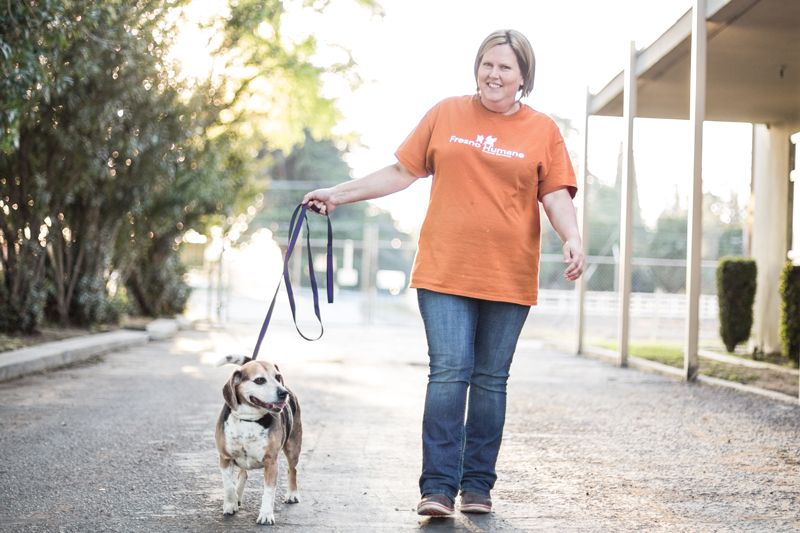
Community connections
While it awaits the development of a more appropriate facility, Mitchell says FHAS is “figuring out ways to see through the challenges and start making [the community] a better place for animals.”
Community outreach is one staple of FHAS’s approach. The group serves a largely Hispanic population and makes sure to always have a Spanish-speaking employee available; a bilingual dispatcher teams up with an animal control officer for calls concerning dogs at large, and they let community members know about FHAS’s low-cost spay/neuter, vaccination, microchipping and licensing services. Mitchell has found the persistent myth that Latinos don’t believe in spay/neuter to be false. The Hispanic community is largely receptive to the idea of fixing their pets but unsure of where to find services, she says.
“When you’ve already given up on an entire demographic, it’s pretty hard to be successful,” she notes. “We were thrilled that when we said, ‘Hey, this is what we want to do. Are you up for it?’ … they were like, ‘Oh my gosh, yes, we’ve wanted to do this for our dog, but we didn’t know how, or we were scared.’”
FHAS sends its spay/neuter clients who don’t go to the HOPE clinic to Dumars’ clinic. FHAS also sponsors two rabies vaccination clinics a month, one at its facility and one in the community, targeting areas that have a large number of calls for service and that add the most to shelter intake. The clinics give FHAS a chance to provide microchips and vaccinations while talking to pet owners about spay/neuter services.
Because it holds the county animal control contract, FHAS does wield its enforcement stick on occasion, but always with the best interests of the animals or the community in mind, Mitchell says. FHAS officers take the approach that, “It’s their job to go out … and solve problems in the field, as opposed to taking every dog they see,” Rockhold adds.
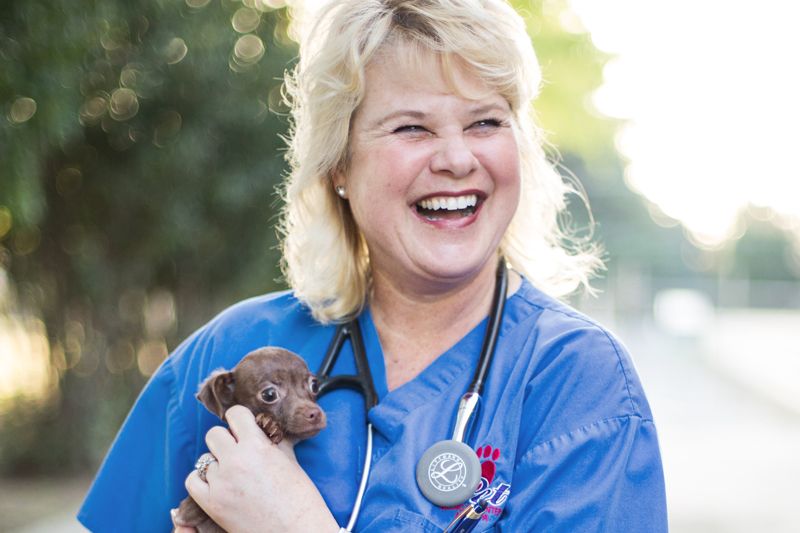
FHAS aims to treat every situation individually, so when an owner arrives to reclaim a dog but lacks the reclamation fee, there’s room for negotiation. Recognizing that owners who fail to reclaim their dog at the shelter will simply acquire one somewhere else, FHAS aims to send animals back home, fixed, often for a charge that’s substantially below the normal reclamation fee. Mitchell explains that people who would normally have to pay $200 can get their dog neutered, vaccinated, microchipped and tagged for $50—and even that charge can be waived. The only people paying the full fees are those who refuse to get their dogs spayed or neutered. The overriding goal, Mitchell adds, is that all dogs leaving FHAS will be altered and have an ID tag—which will ultimately reduce intake.
FHAS has embraced the idea that it takes a village of people with a variety of expertise to run a successful shelter and animal control operation. Rockhold knows the enforcement side, for example, having worked as an animal control officer with the Clovis Police Department and as director of animal services in nearby Kings County. She notes that she initially balked when Mitchell asked her to join the FHAS team. Things were going well in Kings County, where spay/neuter had expanded and new ordinances had moved the county into the 21st century, but eventually she decided, “OK, well, it’s time for another challenge, right?”
Dumars, who advises the shelter on medical protocols, has practiced small-animal medicine since 1990, and in 2009 she purchased a local emergency hospital, which now handles FHAS’s cases needing immediate attention. To improve her shelter medicine skills, Dumars last year completed an online course offered by the University of Florida. What she learned about controlling infectious diseases came in handy right away: FHAS inherited an overcrowded shelter and immediately faced a huge distemper outbreak.
What is the FHAS team proudest of so far?
“Just the fact that we’ve lasted and not gone crazy,” Rockhold says with a laugh. She notes that FHAS, like other good animal control organizations, regularly faces circumstances that require its workers to stay late and step outside their comfort zones. It’s her most difficult situation as a supervisor, she says, but she’s grateful to be surrounded by people who have the same goals and focus.
Rockhold summarizes FHAS’s situation like this: “Challenging? Absolutely. Insurmountable? No.”


